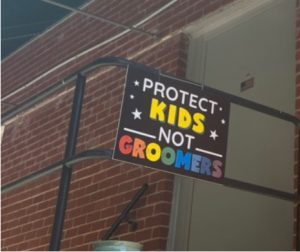We fear shark attacks despite being far, far more likely to die in a car wreck while driving to the beach than being bit by a shark once at the beach.
Shark attacks make the national news precisely because they rarely happen. By being on the national news, the shark attacks stand out in our minds more than the hundreds of fatal car accidents. We often let our subsequent prejudices shift our focus from general danger to specific but less likely danger.
I recently traveled through the heart of Bible Belt country — passing through the intersection of Tennessee, Alabama and Georgia. A lover of backroads and mom-and-pop restaurants, I stopped for lunch in Lookout Mountain, Tenn. It was bustling, and I had to park on the back side of a row of quaint shops.

Brad Bull
On one of the back doors was a sticker of an ichthus — you know, the Christian fish symbol. Above it on a balcony rail was a sign that said, “PROTECT KIDS NOT GROOMERS.” The word “groomers” was painted in rainbow colors.
Call me crazy, but the implication seemed to be that gay people are grooming children.
Maybe they were specifically worried about transgender people doing public readings. To be clear, I strongly affirm protecting children from sexual groomers. My question was and is, why the rainbow colors — as if children don’t need to be protected from heterosexual groomers?
The next day, during some downtime at the family reunion I attended, I started perusing headlines in Baptist News Global and Christianity Today. There were not one but three stories of separate instances of sexual groomers. Yeah, you know what’s coming. None were transgender folks reading at libraries, although one of the three was accused of grooming same-sex relationships.
One article was titled “Texas Youth Pastor Booked by Feds on Child Sexual Abuse Charge.” The person accused of abuse is a male. The article doesn’t indicate if the alleged victims were males or females. They were, however, children.
The second article was “Pressler’s Death Brings Overwhelming Sorrow,” which offered something of an “I’ve come to bury Caesar and curse those who are just as bad even if in different ways than his alleged behavior.” In the case of Sunday school teacher Paul Pressler, the allegations were of sexual exploitation — to which a financial settlement was reached.
 The trifecta came with “Robert Morris Resigns from Gateway Following Past Abuse Allegations.” The article reported, “Morris — a former adviser to President Trump and leader of one of the largest nondenominational churches in the country — is leaving after an Oklahoma woman, Cindy Clemishire, shared a story of being molested by the pastor when she was a minor in the 1980s. He has led the congregation since 2000.”
The trifecta came with “Robert Morris Resigns from Gateway Following Past Abuse Allegations.” The article reported, “Morris — a former adviser to President Trump and leader of one of the largest nondenominational churches in the country — is leaving after an Oklahoma woman, Cindy Clemishire, shared a story of being molested by the pastor when she was a minor in the 1980s. He has led the congregation since 2000.”
After acknowledging my sorrow for the victims, let me say these headlines coming on the heels of that “rainbow groomers” sign got me thinking about some things.
First, obviously not all ministers are groomers. Many Christians will loudly object to judging all ministers based on the minority of corrupt ones. Yet some of the loudest of these will rush to generalize same-sex abuse to the whole LGBTQ community.
For instance, I once was in a church group with a man who couldn’t get past his homophobia. It’s understandable. As a child, he was molested by a man. He could not differentiate between homosexuality and pedophilia. He saw them as one in the same — even when I pointed out all the females he knew who were molested by heterosexual males.
The line of reasoning was this: “All gay people are child molesters because a gay person molested me, but I’m a heterosexual and not a pedophile, so not all heterosexuals are pedophiles.”
During a conversation about this, I raised the case of Penn State football coach Jerry Sandusky, who was convicted on 45 counts of child sexual abuse. My friend did not believe the allegations and said, “He’s not gay, he’s married to a woman.”
If you’re confused, that’s the point. Our biases lead to blindingly bad reasoning — and behavior.
 Bad behavior? The juxtaposition of that rainbow “GROOMERS” sign and the headlines about groomers who were ministers brought to mind a third thing: The iconic diner scene in Alfred Hitchcock’s brilliant film The Birds. The scene portrays the various ways people respond to threats.
Bad behavior? The juxtaposition of that rainbow “GROOMERS” sign and the headlines about groomers who were ministers brought to mind a third thing: The iconic diner scene in Alfred Hitchcock’s brilliant film The Birds. The scene portrays the various ways people respond to threats.
In the first segment, a young woman named Melanie Daniels (played by the great Tippi Hedren) has come into the diner to call her father and report seeing school children attacked by a murder — of crows. Daniels is trying — along with her friend Mitch — to proactively address a threat to children’s well-being. As she begins describing the situation, various onlookers get involved. Their behaviors serve as a cautioning mirror.
An ornithologist named Mrs. Bundy discounts the gravity of the situation. The information being presented is outside her experience, so it is not to be believed as truly a problem.
A heavy drinker at the end of the bar — listed in the credits as “Drunken Doomsayer” — begins quoting Scripture and saying, “It’s the end of the world!” (I’m reminded of a seminary theology professor who said, “When my father was sober, he was an atheist. When he was drunk, he was a fundamentalist Christian.”) The religious zealot’s reaction is to assert that God is lashing out because of other people’s behavior.
A fisherman — cleverly named “Sholes” — affirms he also saw an attack by a flock of birds. He admits he doesn’t know what the underlying problem is but is skeptical of any need for alarm.
A woman — described in the credits as “Hysterical Mother” — asks the waitress to ask the other patrons to lower their voices because they are “scaring the children.” Let’s pause with this character. First, kudos for thinking of the children, but don’t children need appropriate fear of something that’s dangerous? Second, it’s clear that besides the children, it is the woman who is scared but in a counterproductive way. She’s too scared to even speak up for herself; she asks the waitress to do it.
On the other end of the spectrum is a traveling salesman who aggressively spews his disdain for all birds. “Get yourself guns and wipe them off the face of the earth.”
A bit later the area outside the diner is attacked by birds. Mayhem and death occur.
Back inside the diner, Daniels finds a group of women sheltering for safety. Ornithologist Bundy will not make eye contact, apparently ashamed of her having been stuck in her own experience and not listening to new information.
 “Hysterical Mother” approaches Daniels (in the lions’ den) and, in a rage, says, “I think you’re the cause of all this! I think you’re EVIL! EVILLLLL!”
“Hysterical Mother” approaches Daniels (in the lions’ den) and, in a rage, says, “I think you’re the cause of all this! I think you’re EVIL! EVILLLLL!”
Yeah, we likely all have a sense of smug satisfaction when Daniels slaps the bejeezus out of Hysterical Person. And maybe we then laugh at Daniels’ swooning melodramatic regret directed by Hitchcock. But at least she regretted what was happening. It’s tempting to say Hysterical Person deserved getting smacked but, come now, let us reason together. Let’s allow others’ bad behavior in handling bad behavior to condemn itself. We need not stoop to their aggression, whether physically or verbally.
Sure, it’s hard not to resort to physical and ideological violence — especially when violence and ignorance are so celebrated. On that same trip where I saw the rainbow “groomer” sign, I had another encounter with a far more permanent proclamation.
I had just passed through a one-traffic-light Georgia town where the sights made me smell the warmth of an 8-track player mingling with the aroma of the cracked vinyl dash of a 1973 Camaro. A bit later I stopped at a historic cemetery. Among the hundreds of markers, I saw a mammoth obelisk tombstone marking the grave of two benefactors of a Baptist college. At the summit of the steep cemetery was a giant statue of a Civil War Confederate soldier. It had been erected not in 1875 but in 1975. It bore, in part, this text cut in stone:
This monument is the testimony of the present to the future that these were they who kept the faith as it was given them by the fathers.” (They accepted what was told to them and was consistent with their experience.) “Be it known by this token that these men were true to the traditions of their lineage. … Firm in the conviction of the right.” (The right of enslaving other human beings.)
Personal experience. Faith. Convictions. Signs in paint. Signs in stone.
Before we get dogmatic, we better check the data — and the Golden Rule. It does no good to blame “Ms. Daniels,” Yankees or LGBTQ people for the crises in our lives. If our concern is for children, then we need to be sure we keep our focus on preventing abuse by teaching children to identify warning signs. We increase the risk of abuse if we shift our focus from traits of abuse to vilifying all members of a particular group just because they are different from us. Also, we have to deal forcefully with abusers within our own groups.
I had to pause writing this essay to host a counseling session where the client said something that led me to read the first paragraph about shark attacks. My client said (and I share with their permission), “Yeah, if you’re worried about sharks, but you’re texting and driving? Hello! You are the shark!”
Jesus warned about not being a stumbling block to children. Signs rooted in hatred — by enslavers or homophobes or any form of bigotry — make Christianity offensive to the children of God. This is a stumbling block to faith. Thus, when we claim to be defending the faith but are spouting bigotry, we are the sharks and our signs are for the birds.
Brad Bull is a lover of backroads, mom-and-pop diners and promoting safety for all. He has served as a chaplain, pastor and professor. He currently a writer, speaker and private-practice counselor licensed in Tennessee and Virginia. He may be reached at DrBradBulll.com.


